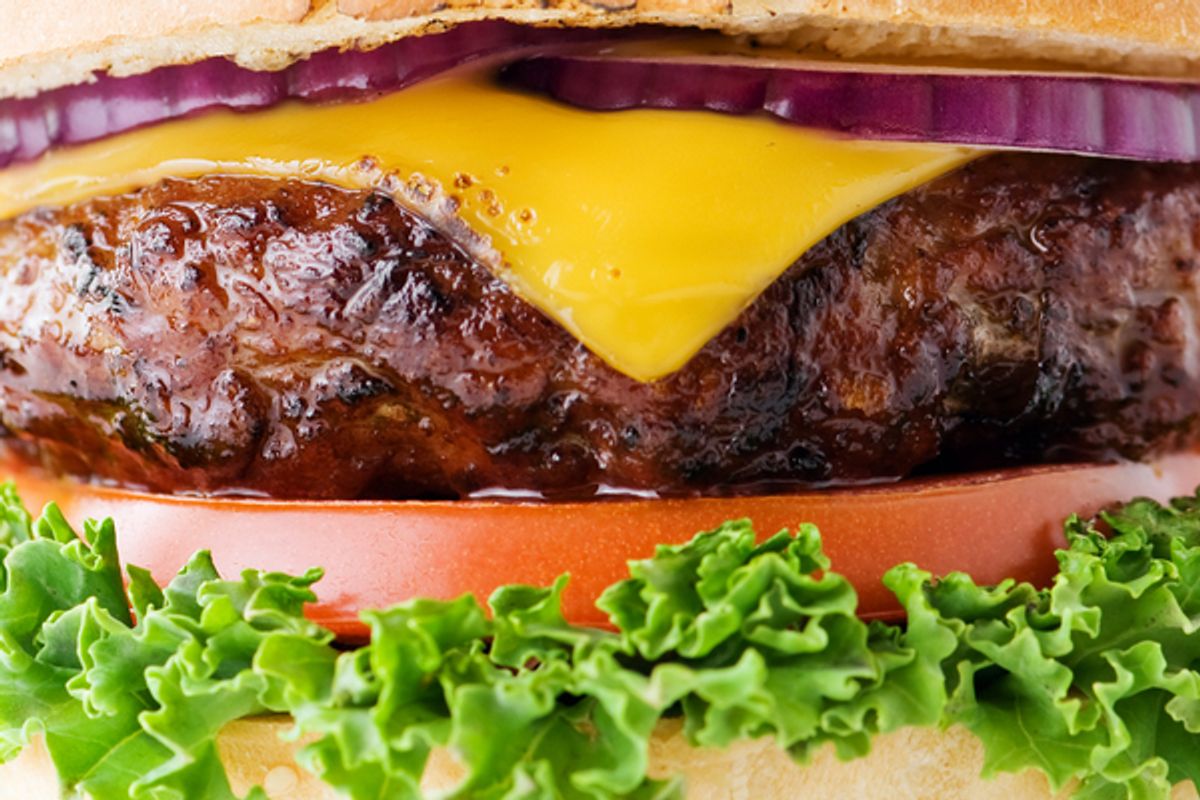It's a great day to be a cow.
On Monday, researchers from the Harvard School of Public Health announced that just a single serving of red meat per day dramatically increases your risk of death – by 13 percent. The odds of developing cancer or heart disease start around 14 percent -- and they climb even higher for people who eat processed meats like hot dogs and bacon. As MedSNBC summed it up, "Americans' love of meat likely accounts for about 1.5 million excess deaths every decade." Damn you, bacon.
It's just another blow for an industry with a reputation that's only slightly worse than Lindsay Lohan's. Despite the continued, relentless urgings that beef is "what's for dinner" and the shudderings of manly men like Herman Cain (remember him?) at the thought of a pizza piled with vegetables, meat consumption in America is on the decline. In fact, meat's had an image problem ever since Oprah declared she was through with burgers after the mad cow disease outbreak of the 1990s. The problem continues with the latest controversy over "pink slime" (beef scraps treated with ammonia) being served in our children's school lunches.
The Atkins diet was beef's biggest friend for a moment, but over the last decade, the industry has suffered blows from searing exposes like Eric Schlosser's book "Fast Food Nation." When I looked for news of e. coli warnings about meat while writing this piece, I found a major recall that had been posted just this morning. Add the overhaul of the food pyramid, the popularity of "meatless Mondays" and a general movement toward plant-based diets, and you've already got a radical shift in how we feel about eating animals.
Of course, the Harvard study's dire warnings are already being met with pushback from the kind of Internet commenters who insist, "I'm going happy, hello Ribeye!" Behold that certain, modern insistence that whatever it is, you'll have to pry it out of our cold, dead hands. "More BS from the food police!" They're coming for our brisket! They're going to force us to eat nothing but salad!
But life doesn't have to be all or nothing. I stopped buying plastic-wrapped meat from the back of the supermarket the day I watched the documentary "Food, Inc." I still buy meat, however, from local, trusted sources. It's considerably more expensive than the Manager's Specials of yore, which is why my family eats a whole lot less of it. It's not a big deal – my older daughter has been inclined toward vegetarianism since she was a baby, picking the meat out of every meal since she could muster finger-thumb dexterity. Her younger sister, meanwhile, would rather have pasta than anything. No meat? No problem. I like the flavor and flexibility of being a sometime meat-eater, of knowing that boeuf bourguignon is still an option and that I don't have to sweat the menu when I'm traveling or a guest at someone's home. I also like supporting the hard-working farmers who make their living from their livestock, who aren't part of the grotesque industrial-meat complex. And I'm really not fond of the smug, in-your-face variety of vegetarianism that gets giddy with every new study about What Will Kill You.
Dr. An Pan, the lead author of the Harvard report, writes that the "results indicate that replacement of red meat with alternative healthy dietary components may lower the mortality risk." We eat for a variety of reasons – not just to live but to share, to celebrate, to seduce. It doesn't have to be a struggle against the Grim Reaper three times a day plus snacks. And health doesn't have to be a slog of deprivation and hunger. When you cut down on meat – when you make the choice to not eat it every single day -- you find other foods that are satisfying and often cheaper and easier to cook. You appreciate the beauty of a reasonable portion of a really great cut of meat. And you realize that it's possible to live without sanctimony and fear.



Shares